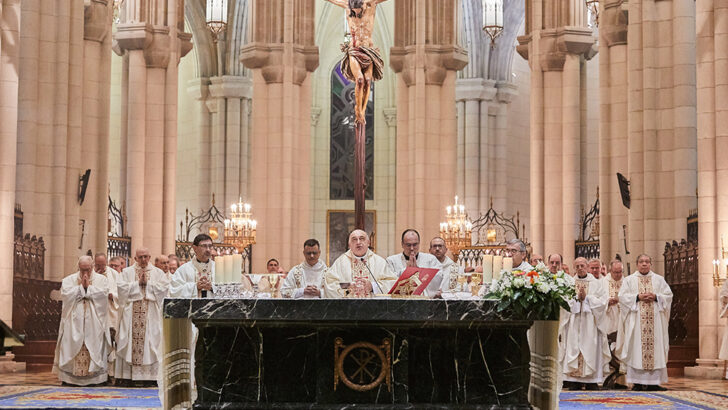If you wanted a book about saying Mass, would you turn to a professor of maths and computer science? My guess is that you wouldn’t — but I have come across one who writes well on the subject — and has a catchy title to his topical book to boot.
How Not to Say Mass was Professor Dennis Smolarski’s 2006 book. If I wrote a book on Mass, I’d want to borrow that name from Fr Smolarski (yes, he is also a Jesuit). Here’s a sneak preview of my unwritten tome: a few ideas about how to keep people engaged in Mass — through participation, speed and silence.
- Participation: We priests shouldn’t say Mass as if we were the only participant!
Once people have the chance to participate in the Mass, it never feels boring. Children bringing up the bread and wine concentrate vividly as they wait for their moment of glory (as do their parents). Young people reading the bidding prayers have to be attentive so they don’t miss their time to come forward and pray. These prayers can be read by up to six young people – why not!
Churches have bigger occasions to celebrate from time to time, especially in rural Ireland — the opening of a new GAA pitch, the anniversary of a local club, the retirement of a sacristan. A procession from the door at the start should involve many people, carrying mementos that imaginatively reflect the occasion.
Songs help too. In this COVID has been our friend. Irish people were told not to sing during COVID so due to our centuries-old contrariness, we haven’t stopped singing since. And often now the whole church sings. Once people have the chance to participate in the Mass, it never feels boring.
- Speed: it kills the Mass
COVID has made a difference with regard to the duration of Mass too. It’s not that people want a long and boring celebration, it’s that most who come to Mass now want to be there, so they are not in a rush.
The crowds who used to arrive late and stand at the back have largely vanished. COVID did for them — not that it killed them off literally, it forced a decision, it helped churches shed the lukewarm and the distinctly cold. If people are at Mass now, it is because they want to be there, so they can invest in a substantial celebration, not 30 minutes or fewer, but maybe 40 or 45 minutes. How not to say Mass? Speedily!
- Silence (It’s golden!)
In every Mass I celebrate I find five spots for silence (in Sunday Mass, but at weddings and funerals too): at the Penitential Rite, at the start of the opening prayer, after the homily, before the end of the Bidding prayers and after Communion. Those 100 seconds give everyone a chance to enter the silence and pray in their hearts.
How not to say Mass? With too many words and not enough silence.
I welcome your tips at frbernard1984@gmail.com
**
Can I recommend a book? I have read this one three times; I find more cause for reflection each time. “The Gift of Being Yourself” is its name, sub-titled ‘The Sacred Call to Self-Discovery’, by David G. Benner (InterVarsity press 2015) with a foreword by M. Basil Pennington.
And no, it’s not an exercise in psycho-babble by one of those ‘cos-I’m-worth-it’ peddlers. This book is profoundly faith-full. Penner’s thesis is that if I find God I find my true self, and if I find my true self I find God.
It helped me a lot. It could help you too.
***
The inquiry into the Grenfell Tower fire published its report last September. The Spectator carried a commentary piece by Peter Jones on ‘The Lessons of Grenfell’ , which noted that steps were to be taken to ensure that such a disaster would not happen again.
Safety regulation and technology ensure we can do far more about disasters than the Romans ever could, he commented. But his telling point followed: “Passing yet more laws will not prevent more Grenfells: it is not the laws that count but the moral values of the people working under them.”
Your thought for the day.



